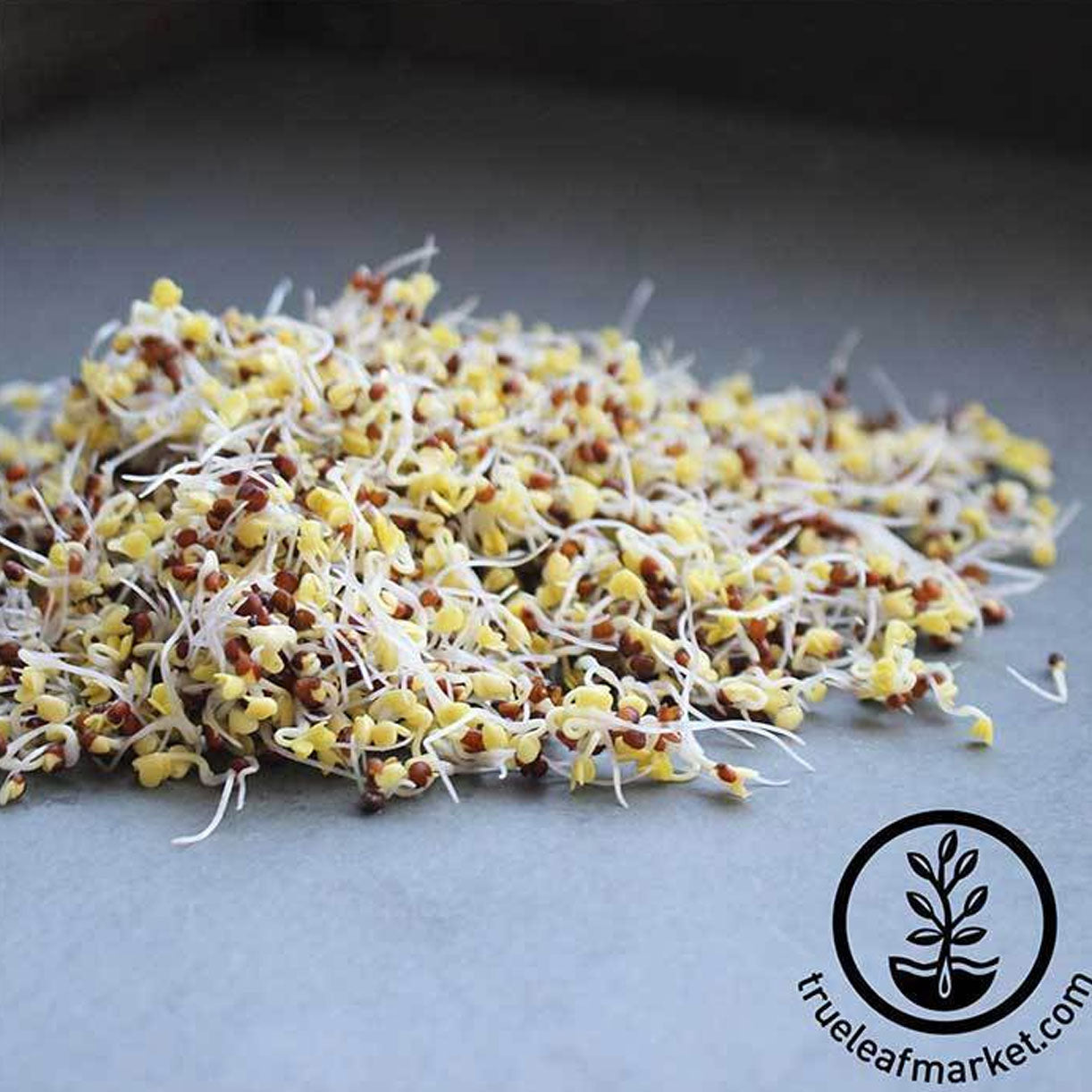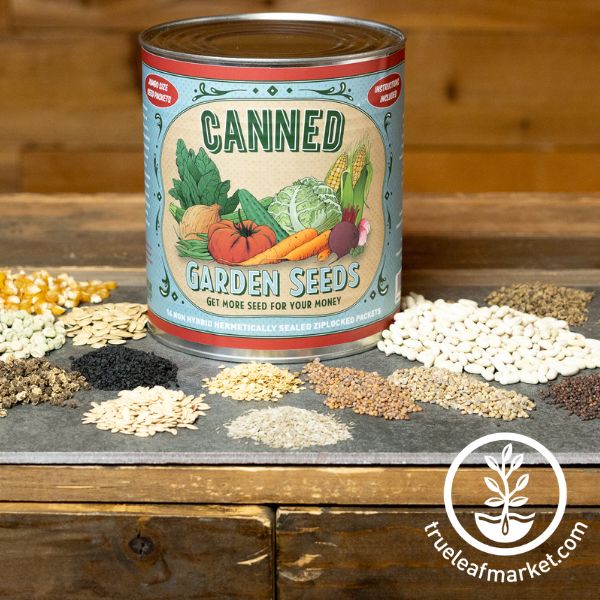
Ashleigh Smith

Whether you are preparing for a flood, snowstorm, fire, or other emergency events, don’t find yourself without emergency food storage. Food insecurity is one of the biggest concerns when an emergency situation arises, but it is one of the easiest things to plan ahead for. When building your food storage, consider both short and long-term solutions. Keeping a supply of grains and legumes on hand will enable you to make some basic foods like bread, pancakes, granola, hot cereal, chili, soups, and so much more! Storing sprouting seeds will also allow you to have a balanced and nutrient-dense diet when fresh foods are hard to acquire. For greater long-term food security, store garden seeds for seasonal planting, harvesting, and home processing.
Grains For Emergency Food Storage
Grains are some of the most useful seeds for long-term food storage because of their incredible shelf-life. When stored in sealed containers and kept in a cool, dry place, they can last for decades. Plus, they have many versatile uses and contain essential nutrients like carbohydrates, fiber, protein, vitamins, and minerals. Grains are easy to prepare in an emergency situation.
Pro Tip: Don’t forget to also add some spices to your food storage as a way to dress these grains up a bit. Some of my favorites include cinnamon, garlic powder, onion powder, cumin, coriander, and sage. Spices are best rotated and replaced every 3 years.
Wheat
Wheat is known as the “staff of life” because of the fundamental role it has played as a life-sustaining food. Its versatility allows it to be used for breads, pastries, pasta, dough, cereal, crackers, tortillas, and more! In cans, wheat can be stored for 20 years or more. Wheat features an array of important nutrients, including complex carbohydrates for sustained energy, dietary fiber for healthy digestion, gluten protein, B vitamins, and minerals, including iron, magnesium, phosphorus, zinc, and manganese. It also contains the antioxidants selenium (which protects cells from damage) and phenolic compounds (which reduce inflammation and protect against chronic diseases). If you or someone in your family has a sensitivity to gluten, you may want to consider utilizing corn as a flour replacement in emergency situations.
Oats
Oat groats are one of the most versatile grains to keep in your emergency food storage. Oats are cereal grains that contain an outer hull. This hull is tough and hard to digest as it is meant to protect the viability of the seed. However, for the oat to be useful for cooking, it is best to use hulless varieties or oat groats (hulled oats). These can be processed into rolled oats, instant oatmeal, steel-cut oats, or flour.
Rolled: Oat groats that are steamed, then flattened by steel rollers into flakes. These are also called old-fashioned oats.
Cook: Boil 3 cups of water. Add 1 2/3 cups of rolled oats and return to a boil. Simmer for 5-7 minutes. Let sit, covered, for 3 minutes.
Quick-Rolled: Oat groats that are cut into small pieces before being rolled for faster cooking.
Cook: Boil 3 cups of water. Add 1.5 cups of quick-rolled oats and return to a boil. Simmer for 1 minute. Let sit, covered, for 3 minutes.
Steel-Cut: Oat groats that have been sliced by a steel blade.
Cook: Boil 2.5 cups of water. Add 1 cup of steel-cut oats and return to a boil. Simmer for 20-25 minutes.
Corn
While wheat is known as the "staff of life" to those of European origins, corn is similarly referenced as "The Gift of the Gods” by those native to the Americas. Like wheat, corn is rich in carbohydrates and can be used in various forms. The most common uses relating to emergency food storage include popcorn, cornmeal, flour, and porridge. For emergency food storage intended for grinding, we recommend using dent varieties.
Beans and Other Legumes for Emergency Food Storage
Legumes are best known for their nutritional value, as they are rich in protein, fiber, vitamins, and minerals. Their micronutrients include iron, magnesium, potassium, and folate. When legumes are consumed in combination with grains, they form a complete protein. This means all the essential amino acids that the body needs are provided. Beans are a must-have staple in every emergency food storage kit because they are versatile and can easily be turned into a nutritious, filling, hearty, comforting meal amid stressful chaos.
Sprouting Seeds and Supplies For Emergency Food Storage
Sprouts are the highly underrated heavy-lifters of emergency food storage. Why? Because they can generate a bountiful harvest of nutritional food in just a few days. Continually growing and harvesting a rotating crop of fresh sprouts will keep you and your family fueled with fresh and vital nutrients without any complex storage or cooking processes. Growing sprouts is as simple as soak, rinse, drain, and repeat. Store a variety of beans, legumes, cruciferous, and leafy green vegetable seeds for a variety of flavors and textures.
Garden Seeds For Emergency Storage
When you think of the damage and delays associated with an emergency situation, you likely consider the delays surrounding food, fuel, cleaning, and clothing supplies. However, strikes, storms, and worldwide distribution delays have also proven to affect long-term food security. The COVID pandemic taught us that nothing is guaranteed. With deliveries being delayed around the world, along with a frenzied increase in garden seed demand, seed suppliers saw record-high depletions in seed inventory. As inventory has returned to healthy levels, it is important to remember the power of having seeds available to produce your own food in times of need and uncertainty. Add garden seeds to your food storage supply today for greater confidence and peace of mind that you will be prepared for the inevitable emergencies of the future.
About the Author

I'm Ashleigh Smith, a native to Northern Utah. I first gained a love of gardening with my grandmother as I helped her each summer. I decided to make a career of it and have recently graduated with a Bachelor's degree in Horticulture from Brigham Young University - Idaho. My studies have focused on plant production while I also have experience in Nursery & Garden Center Operations.
Our Recommended Picks
Leave a comment
Your email address will not be published. Required fields are marked *
0 Comments
No Comments yet! Be the first to start a conversation
Further Reading

November Gardening Guide: 5 Tasks to Prepare Your Garden for Winter
Written By Lara Wadsworth November is a key transitional month in the garden. Most zones are gathering in their last rounds of harvests, but the entire garden isn’t quite dormant yet. Even if the frost has arrived in your growing location, there’s stil...

Ashleigh Smith
2025-11-036 min read0
How to Choose the Right Tobacco Seed Variety for Your Garden
Selecting the right tobacco seed variety can make or break your growing season. For experienced gardeners, this choice isn’t just about aesthetics—it’s about matching your growing environment and goals with the perfect plant genetics. Whether you’re gr...

Ashleigh Smith
2025-10-294 min read0
Everything You Need to Know About Tobacco Seeds
Growing tobacco seeds is an art form for seasoned home gardeners. Whether you’re intrigued by the plant’s ornamental qualities, want to harvest for fresh processing, are curious about heirloom varieties, or simply love the challenge of nurturing delica...

Ashleigh Smith
2025-10-297 min read0
Mild Climate Winter Gardening Guide for Zones 9 & 10: What to Plant and When
Coming soon!

Ashleigh Smith
2025-10-171 min read0

































